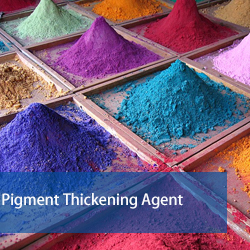Pigment Thickening Agent
-
- Unit Price: USD 5 / Bag/Bags
| Min.Order |
Unit Price |
| 1 Bag/Bags |
USD 5 / Bag/Bags |
- Brand: SKYIMG
- Packaging: 60kg/130kg net in plastic drum
- Supply Ability: 800KG/Month
- Min. Order: 1 Bag/Bags
- Certificate: ISO/SGS
Properties and Features
The use of SiO2 (silica) as a thickener for reactive dyes printing offers excellent stability and performance benefits. SiO2 is known for its high surface area and strong binding properties, which help to improve the adherence of the dye to the fabric and prevent bleeding or fading. The...
-
- Unit Price: USD 5 / Bag/Bags
| Min.Order |
Unit Price |
| 1 Bag/Bags |
USD 5 / Bag/Bags |
- Brand: SKYIMG
- Packaging: 60kg/130kg net in plastic drum
- Supply Ability: 800KG/Month
- Min. Order: 1 Bag/Bags
- Certificate: ISO/SGS
Properties and Features
There are different types of pigment printing thickeners available, including synthetic thickeners and natural thickeners. Synthetic thickeners are often preferred due to their high viscosity, stability, and compatibility with a wide range of pigments and fabric types. Natural thickeners, on...
-
- Unit Price: USD 5 / Barrel/Barrels
| Min.Order |
Unit Price |
| 1 Barrel/Barrels |
USD 5 / Barrel/Barrels |
- Brand: SKYIMG
- Packaging: 60kg/130kg net in plastic drum
- Supply Ability: 800KG/Month
- Min. Order: 1 Barrel/Barrels
- Certificate: ISO/SGS
Properties and Features
Pigment printing thickener is a type of chemical additive used in the textile industry to enhance the viscosity and stability of pigment printing pastes. It helps to improve the printability and color yield of pigments on fabric surfaces. Recommended Dosage
1.2%-2.0%, depending on the binder,...
-
- Unit Price: USD 5 / Bag/Bags
| Min.Order |
Unit Price |
| 1 Bag/Bags |
USD 5 / Bag/Bags |
- Brand: SKYIMG
- Packaging: 60kg/130kg net in plastic drum
- Supply Ability: 800KG/Month
- Min. Order: 1 Bag/Bags
- Certificate: ISO/SGS
Properties and Features
High concentrated pigment powder silica dioxide is a finely ground powder that contains a high concentration of pigment particles and silica dioxide. This type of pigment powder is commonly used in various industries such as cosmetics, paints, coatings, and plastics. The high concentration of...
-
- Unit Price: USD 5 / Bag/Bags
| Min.Order |
Unit Price |
| 1 Bag/Bags |
USD 5 / Bag/Bags |
- Brand: SKYIMG
- Packaging: 60kg/130kg net in plastic drum
- Supply Ability: 800KG/Month
- Min. Order: 1 Bag/Bags
- Certificate: ISO/SGS
Properties and Features
1. It is a kind of high performance printing thickener with high concentration developed purposely for
textile pigment printing. It is safe in use. Due to the properties of the product itself and application
technique, it will bring an effect in reducing environmental pollution and hence is...
China Pigment Thickening Agent Suppliers
A Pigment Thickening Agent, also known as a rheology modifier or thixotropic agent, is a type of chemical substance that helps in controlling the viscosity and flow properties of paints, inks, and other pigment-based products. These agents can increase the viscosity of the mixture without changing its other properties such as color, opacity, or drying time.
The primary function of a pigment Thickening Agent is to prevent the sedimentation of pigments over time, ensuring a more consistent product quality. This is particularly important for products where the pigment concentration is high. Here are some common types of pigment thickening agents:
1. Polymeric Thickeners: These are large molecules made from polymers that form networks within the paint, providing stability and viscosity.
2. Organic Thickeners: These include substances like bentonite, carboxymethyl cellulose (CMC), and polyvinyl alcohol (PVA). They are often used because they are compatible with a wide range of pigments and solvents.
3. Inorganic Thickeners: Examples include clays like bentonite and kaolin. They work by absorbing water and swelling, which increases viscosity.
4. Hydroxyethylcellulose (HEC): A type of cellulose derivative that can be used to thicken aqueous systems. It's biodegradable and food-grade.
5. Cellulose Ether Derivatives: Such as hydroxypropyl methylcellulose (HPMC) and methyl cellulose (MC), which are used in both waterborne and solvent-based systems.
6. Polyacrylates: Synthetic polymers that can be used to adjust viscosity and stabilize dispersions.
7. Silicones: These can be used to modify the surface properties of pigments, affecting their dispersibility and the final viscosity of the mixture.
Choosing the right thickening agent depends on several factors including the type of pigment, the solvent system, the desired viscosity, and the environmental impact considerations. It's crucial to test different agents under similar conditions to ensure compatibility and optimal performance.
Printing Pigment Thickener Related Products



